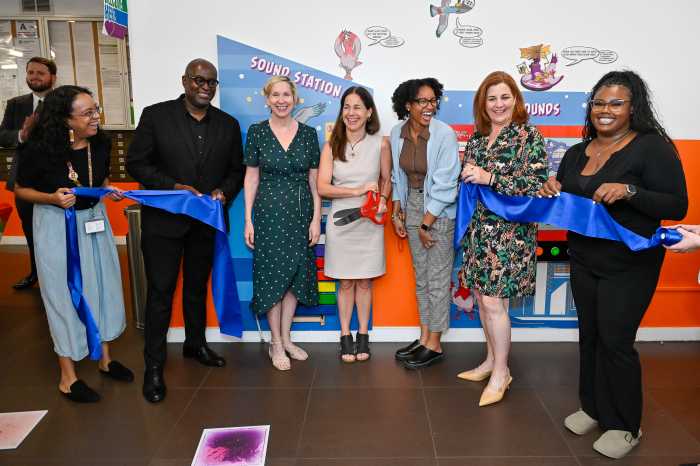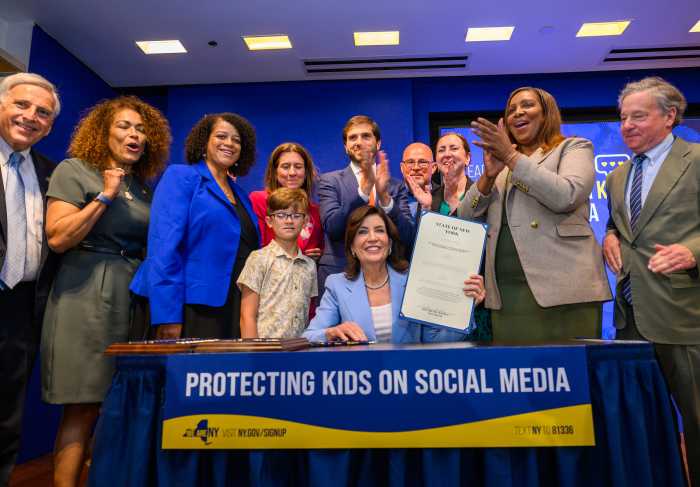Eli was in the store, trying on new sports specs, staring at the reflection of his sweet freckly face in the mirror.
“You look cool,” I said, admiring him (even though I knew it wouldn’t matter). My kids have told me many times that the opinion of one’s mother doesn’t really count.
“You’d say that to anyone who was your child,” Oscar will say with a snort when I compliment him on anything.
I suppose it’s true that I would love and cherish any little beings who were mine, so it’s difficult to convince them that I am a harsh critic and that I really do think they are super smart, attractive and funny and a million other things. How do I make them see themselves as other people see them, in the good ways?
I think often of a scene from “Sixteen Candles” in which Molly Ringwald’s character is sitting in the dark feeling forlorn about her lack of popularity. Her father sits down next to her and tries to console her.
“I don’t think you’re a dork,” he says, “I don’t think your mother thinks you’re a dork…”
She doesn’t even have to say anything, the look on her face is enough. It says, “Good try, Dad, but you’re useless.”
I related at the time to Ringwald, lonely and afraid of never being loved. But now, I am that parent, and it’s incredibly frustrating, being rendered useless in the important job of boosting a child’s confidence.
So in the optometrist’s office, Eli heard me say that he looked “cool,” but shook his head.
“No,” he said. “I’m really not cool.”
He named certain of his friends who he thought were cool and looked cool. But then, still staring, something occurred to him.
“Maybe no one actually thinks they’re cool,” he said.
Perfect! The realization that we are all insecure, trapped inside a mind and body not of our own choosing, that we cannot truly see 3-D, is a great one to have early on. Not that it always helps, but it least it can offer a reality check when one’s reflection rears its sometimes ugly head. It is great to remember that no one escapes self-scrutiny unscathed, not even supermodels or the most revered of celebrities.
I’d like to take credit for Eli’s burgeoning belief that everyone feels the same insecurities, and in fact I do try to make my children and myself remember that every single person has his issues despite external signs to the contrary. More likely, though, since my constant blather of deep thoughts usually goes ignored, like the wonky voice of a Peanuts parent, he has realized this through books.
I particularly point to the new crop of diary-based children’s books for Eli’s rueful understanding of how he feels and how he might imagine others feel, too. “Diary of a Wimpy Kid,” was brilliant in helping explicate the life of a child who often feels left out. More recently, on vacation, Eli picked up the “Nerds” books, laughing a lot, maybe relating. He wears glasses, likes chess, loves books… By those traits alone, he could certainly pass for what society deems nerdy (not that there is anything wrong with that).
I myself have been dubbed a nerd in a quiz my kids gave me because of my proclivities to read and write. “Park Slope is filled with nerds,” a friend said to me recently, and he wasn’t talking about the kids.
It is a conversation we have a lot in my house, trying to define what’s cool, what’s nerdy, who decides and who cares. Is it possible to be smart and cool?
The real question is why we need such designations at all. I guess there is some animal instinct always to create a “Them” as a negative foil to the “Us.”
“Bill Gates is a nerd,” Eli has said often, proudly, as if the status he has assigned himself is a club with very elite members and that makes him feel better.
I don’t care what my kids call themselves, even what others call them, as long as they believe they can do anything. I don’t care if they don’t listen to me and to what I think, as long as they also don’t listen to others who might try to limit them.
I am trying not to be afraid of others’ assessments of my children, attempting not to take too much to heart how they do on standardized tests. I need to remember to rise above such restrictive boundaries and help them understand that their own self-confidence will be the thing that gets them ahead, the thing that opens doors that might otherwise be closed.
As my kids get older and more cognizant of labels, calling themselves in weaker moments, nerds or losers, I do my best to focus them on their positive qualities, imbuing the admiring opinions of other people, since I know my opinion is moot.
It shouldn’t matter to any of us what other people think, but it is so often in someone else’s eyes that we can see ourselves, hopefully our best selves.
I try to show my kids how sincerely I mean it when I put them to bed with a kiss and a whispered, “You’re fabulous.” If I stare into their eyes hard enough, maybe it’ll sink in.

























